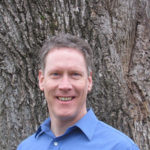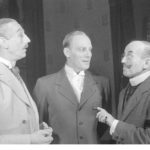Beyond Genre Borders – CSFF Tour, The Begotten
For the first time in almost two years, I am not personally participating in the CSFF Blog Tour. Meaning, I have not read this month’s selection and will not be posting my opinions or feedback or response to the book.
And yet, I want readers here at Spec Faith to know what’s happening in the publishing realm. Christian publishers (or the Christian arm of secular publishers) are slowly making room for speculative fiction, though they may not always admit it.
A case in point is the CSFF Blog Tour feature, The Begotten (Berkley Publishing Group), first in The Gifted series by Lisa. T. Bergren. On her web site, Lisa herself describes the books as historical, but clearly there is a supernatural component to the story.
Publisher’s Weekly calls The Begotten a spiritual thriller but then says:
Disregard Da Vinci Code comparisons and think Lord of the Rings, but without Hobbits and the allegorical trappings.
From talking with Beth Goddard who reviewed the book for the Tour committee, I labeled The Begotten supernatural suspense. However, I understand there is also a romance element too, so I guess The Gifted is one of those series that defies precise genre labeling.
Good for Lisa, I say. In my opinion, books should be read because they are intriguing, well-written, captivating, not because they fall into a certain class. Which is one reason we hold the CSFF Blog Tour. How will readers know what books are available unless someone tells them?
But it seems I am in the minority, and many readers prefer to stay within a particular genre. However, since there are so many sub-genres, we who read some form of speculative fiction bordering on a regular basis, understand one person’s all time favorite may not appear on someone else’s radar screen.
Late last February, I posted about fantasy sub-genres over at A Christian Worldview of Fiction.
The Writer’s Digest had just come out with an article about what genres are hot. Anyone who pays attention to what books and movies are currently doing well knows that fantasy is still riding high. What surprised me, however, was the number of identifiable sub-genres—twenty in all, including urban fantasy, dark fantasy, magic realism, new age, cyberpunk, steampunk, science fantasy, Arthurian, fantastic alternate history … and epic fantasy.
I find it rather amusing, then, that a publisher might have one fantasy series and think this will satisfy fantasy readers. First, we can read more than the one book a year, or in the case of those that are coming out fast and furiously, the two books a year produced by a publisher’s designated fantasy author. But add to that the fact that readers will not all like the same kind of fantasy, and it seems apparent more titles should be on the shelves of Christian bookstores and on the religion shelves of general market stores.
Here’s hoping the books out there will be so successful, publishers will be scrambling to add to their already growing list of speculative writers.
If you’re interested in what the CSFF Blog Tour participants have to say about The Begotten, take some time this week to visit these sites:
Brandon Barr/ Justin Boyer/ Jackie Castle/ Karri Compton/ CSFF Blog Tour/ Gene Curtis/ D. G. D. Davidson/ Jeff Draper/ April Erwin/ Karina Fabian/ Beth Goddard / Marcus Goodyear/ Todd Michael Greene/ Michael Heald/ Christopher Hopper/ Joleen Howell/ Jason Joyner/ Kait/ Carol Keen/ Mike Lynch/ Terri Main/ Margaret/ Melissa Meeks/ Pamela Morrisson/ John W. Otte/ Rachelle/ Steve Rice/ Ashley Rutherford/ Chawna Schroeder/ Rachelle Sperling/ Stuart Stockton/ Steve Trower/ Robert Treskillard/ Laura Williams/ Timothy Wise










































COMMENT:
AUTHOR: Terri Main
URL: http://www.wayfarersjournal.com
DATE: 4/22/2008 3:19:53 AM
I happen to like mixed genre stories. My own work in progress is science-fiction mystery. I would call The Begotten supernatural historical suspense. There’s a small romantic component, but it is a very small part of the story.
I do have a few concerns theologically with the story and I’ll be blogging about that tommorrow at http://www.wayfarersjournal.com/blog.htm .
—–
COMMENT:
AUTHOR: Rebecca LuElla Miller
DATE: 4/23/2008 7:05:01 PM
Ah, yes, the theology of a story. That is certainly an issue Christian writers must deal with. Some of the most strident criticisms of Sharon Hinck’s The Restorer centered on the worship practices (or lack thereof) in her created world.
With supernatural suspense, there is a larger problem—depicting angels and demons who are actual, created beings. How closely must a writer stay with Scripture?
I suggest, very close, just as would be required in any historical novel.
But perhaps that’s not even close to the concerns you had, Terri. I’ll be interested to read your post.
Becky
—–
COMMENT:
AUTHOR: Terri Main
URL: http://www.wayfarersjournal.com/blog.htm
DATE: 4/23/2008 7:25:23 PM
I have the essay up on my blog. I have another essay to write which addresses in general the place of theological “correctness” in speculative fiction writing when it is appropriate when it is not so important. However, I’m not feeling well today, so I’ll let it go until tomorrow, but the basic idea comes down to how close to reality your story is.
Let’s use history as an example. If you are writing a horror story that is set in Victorian London which you say is on the Danube river, you have a problem. Why? Because that is not accurate to the historical setting in the real world. People expect that to be accurate. On the other hand if the story takes place in an alternate universe where the Thames is called the Danube for some reason, then people buy into it because that is something given the contract the reader makes with the author they can accept as part of the fantasy.
So it is with theology. The closer to reality your setting and plot, the more the reader expects the theology to be defensible. If I create a planet where God revealed himself through a type of sentient plant life and I have a theology based on that plant life, the reader will go along with me because of the universe I have created. However, if I set the story in a “real” time and place like 14th C. Italy, then there is an expectation that the theology will be that of this world.
Likewise, the reader will be able to suspend theological disbelief about the existence of certain mythical beings like werewolves and vampires, dragons and pixies, existing in this time and place, if the rest of the theology is supported. Why? Because they know this is not an attempt to create a realistic story.
Historical fiction which includes a supernatural element, particularly one in which the historical detail is so generally accurate is so close to a real world setting, and one in which historical questions of sound doctrine are being debated with the clear assumption that the heroes are possessed of the truth, you need to be scrupulous about your theology.
—–
COMMENT:
AUTHOR: Rebecca LuElla Miller
URL: http://rebeccaluellamiller.wordpress.com/
DATE: 4/28/2008 6:51:20 PM
Terri, this is excellent! I love the clear delineation you make.
Interestingly, one trend in fantasy today is to include the fantasy elements in a real world setting. So we have the real Thames and London and God and the Bible, with fantasy elements X, Y, and Z. I think this mixture may cloud theological issues.
I tend to think however, when it comes to the Bible and things the Bible addresses, there should be less latitude.
Becky
—–